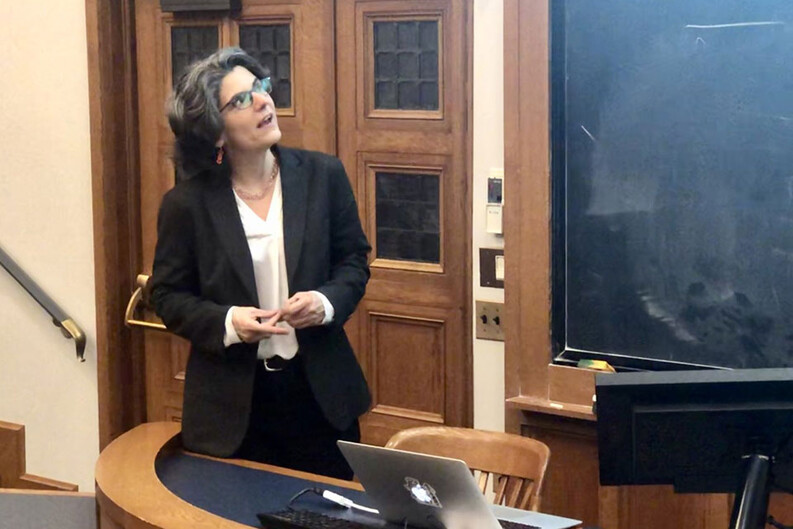Julieta Lemaitre on the “Embattled and Groundbreaking” Peace Process in Colombia

On February 21, 2019, former Robina Human Rights Visiting Scholar Julieta Lemaitre returned to Yale Law School to speak about the challenges and breakthroughs of Colombia’s Special Jurisdiction for Peace, a tribunal created in 2016 to try the Revolutionary Armed Forces of Colombia (FARC) and former members of the Colombian military for war crimes. Lemaitre presides as a judge on one of the tribunals.
In her talk, Lemaitre emphasized the pioneering, restorative approach the jurisdiction has taken, describing her work as “restorative justice that hasn’t really been done before in transitional justice.” She explained that the Special Jurisdiction for Peace represents the first time that a constitutional democracy has had its own court try “members of its own military together with insurgents.” The jurisdiction is the result of a peace agreement between the military and FARC, and its courts only try people who engage in the justice process voluntarily.
The jurisdiction’s commitment to representation is also groundbreaking. Fifty-two percent of the judges of the jurisdiction are women, and Afro-Colombians and indigenous people are serving as judges for the first time in any Colombian high court.
However, Lemaitre acknowledged that “the court itself begins with shaky legitimacy.” When the 2016 peace agreement was put up for referendum, it lost by a narrow majority. The agreement was then modified and passed by Congress. There are many people who still do not support the process, including Colombia’s new president Iván Duque Márquez and parts of the military.
Lemaitre explained the structure of the jurisdiction and the different processes it uses to achieve justice, including both adversarial and dialogic procedures. Once someone is found to be guilty of wrongdoing, there are three types of sentences that can be imposed: penas ordinarias (up to 20 years in prison), penas alternativas (parole or shorter sentences), and penas propias. The latter, which translates to “proper sentencing,” is at the heart of the jurisdiction’s commitment to restoration.
The court’s restorative justice model is fundamentally about making the accountability process victim-centered and addressing the harms victims have suffered. Said Lemaitre, “One of the things we asked victims after listening to their harrowing stories is, ‘What would make the things that happened to you reside in the past instead of the present?’” Lemaitre said she was particularly moved and heartened when a victimized community said they wanted the guerillas to build a school “with their own hands,” because they viewed the lack of formal education available in rural Colombia as contributing to the harm they had endured/suffered.
There are many obstacles associated with this victim-centered model. For example, some victims want retribution, an attitude at odds with the jurisdiction’s method of providing restorative sentences as a benefit for truth-telling. In addition, Lemaitre pointed out, “We don’t always know what will bring closure: why should a victim know both what happened to her and the solution to it?” She recalled a case where victims who had lost loved ones in the conflict asked for reparations, but, upon receiving them, were insulted by the implication that money could replace their loss. The victims only felt satisfied after they received a letter acknowledging that the money could not truly correct the wrongs they had suffered.
The jurisdiction faces external challenges as well, including opposition from President Duque Márquez. “It’s stressful to be working in a situation that’s already so complex and so charged and not to be sure that the rules you’re working with will still be there next month,” Lemaitre said. The United States has also caused problems for the courts. The Trump administration has been “ambiguous in support” for the process, and former guerilla leaders are afraid that if they present themselves to the Special Jurisdiction for Peace they will be opening themselves up for capture by the U.S. government, which still considers the FARCT to be a terrorist organization. In addition, because the U.S. has refused to take FARC off of its terrorist list, any Americans who experienced kidnapping that come as victims to the court could be tried for aiding and abetting a terrorist organization for promoting the benefits of restorative justice for FARC members.
Ultimately, though, Lemaitre is hopeful that the peace process can be a positive force for justice. “We’re hoping this will close cycles of violence,” she said.


